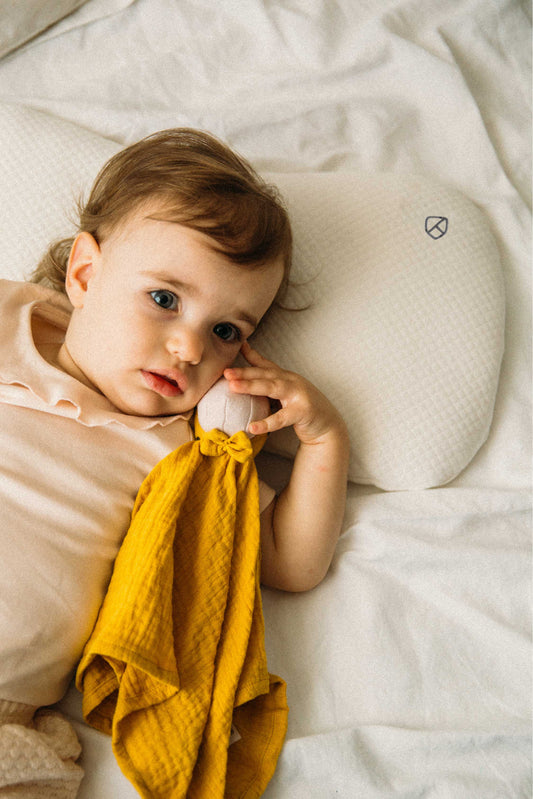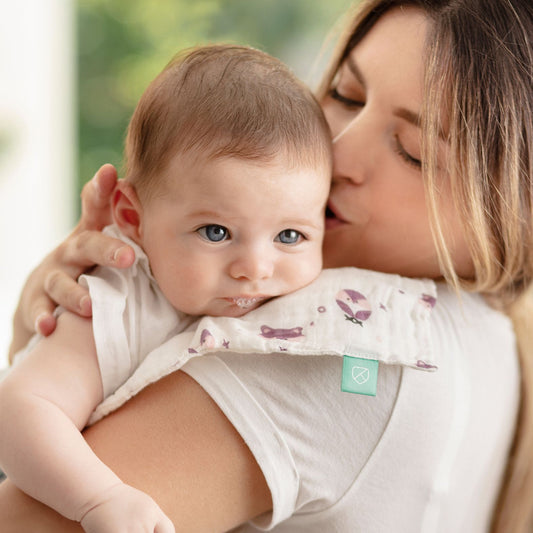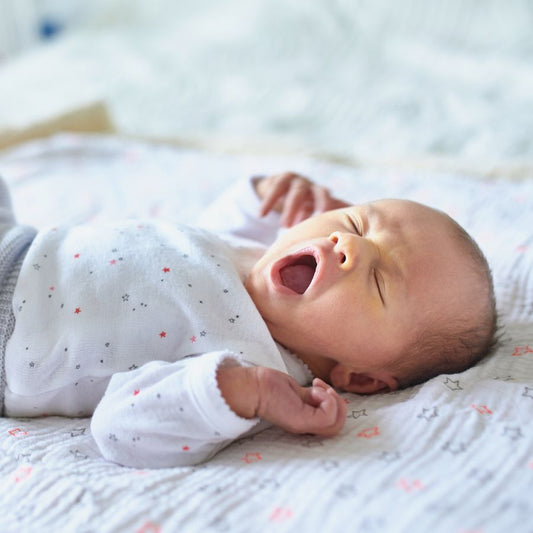They wriggle their arms and legs about during their sleep, sometimes even their head, and you worry that they are in pain or that something is wrong. In reality, there’s nothing to worry about! It is completely normal for babies to stir in their sleep: it means their brain is active.
Keep in mind that babies' sleep is not like ours: infants go in and out of REM sleep continuously, passing from a light to deep state of sleep much easier than us.
As a result, their sleep can be disturbed and they may cry, whimper, squirm, wiggle their head, arms, or legs around.
However, after a few months, babies begin to sleep for longer periods without waking, although episodes of disturbed sleep may still occur. In these cases, what does it depend on?
Why are newborns restless during their sleep
As we said, it’s completely normal for newborns to be restless in their sleep during the first few months, as their sleep cycles differ to ours. Yet, sometimes restless sleep occurs once they are already in a set sleep routine. What are the causes in these cases?
Let’s start with the basics: a baby often wakes during the night when they have a wet nappy, are hungry or hot. If this is the case, once the reason behind their discomfort has been solved, babies will fall back to sleep.
Separation and stranger anxiety generally set in at around nine months, and night-time awakenings can occur more frequently. During this phase it’s crucial to have a sleep routine and to have your baby fall asleep in their own bed. We’ll speak about this in more detail in the following paragraphs.
Waking up during the night can also be caused by physical aspects, such as teething or a cold, which obviously make breathing and a good night’s sleep difficult.
It can also be caused by change, which can have a psychological impact on the baby, such as starting nursery school or the arrival of a sibling.
Generally speaking, we can say that sleep disorders in young children are completely normal and happen at least once during the first 6 years of their lives. They usually disappear on their own.
If they are linked to existing issues or occur frequently and with a certain degree of intensity, it is always best to consult your doctor.
The importance of a sleep routine
A newborn’s sleep pattern differs greatly to that of an adult. Although, over time it evolves and becomes more and more like ours. After a few months, parents can help them to settle into a sleep-wake cycle similar to ours by establishing a well-defined schedule.
One of the most effective ways is to set a good sleep routine. This involves repeating the same activities in roughly the same way each night just before bedtime, so the baby can recognise the signs.
For example: bath, songs, lullabies, soft lighting.
The aim of this goodnight ritual is to calm the baby. Knowing exactly what is coming next reduces their stress and increases their sense of security. This will help them fall asleep more easily and peacefully.
Remedies for restless sleep in infants
After six months, infants start to sleep through the night, however night awakenings can still occur right up until school age.
Firstly, we need to understand the reason why they are waking up, so that we can act accordingly.
For example: are they scared of the dark? You can purchase nightlights, specifically for children, to put on their bedside table that provide low soft lighting. That way, if they wake up, they have some reference as to where they are and their surroundings.
The Italian Society of Paediatrics outlines their 10 tips to prevent and manage sleep disorders in babies:
1. Put your baby to bed at the same time every night.
Get your child used to going to bed at the same time every night, starting from when they are very young. Establishing a rhythm will help them to sleep peacefully.
2. Always put your infant to sleep in the same environment.
In other words, their bedroom. Don't let them fall asleep in mummy’s and daddy’s bed or on the sofa. This also forms part of their sleep routine.
3. Separate feeding from falling asleep.
Obviously, this can’t apply to the very first few months. However, as time goes by, you will start to recognise the signs that they are about to fall asleep, at which point stop feeding them and put them in their cot.
4. Establish a meal and snack time schedule.
Routines are also important during the day: develop and stick to a daily schedule for mealtimes and snacks.
5. Never use tablets or other electronic devices after dinner.
Do not use mobile phones, tablets, or TV at least one hour before bedtime to avoid overstimulation. These devices affect the sleep-wake rhythm negatively.
6. Do not give them too much food or water before bedtime.
A heavy tummy can impact sleep. It’s better to avoid not only food, but also liquids, such as chamomile tea before bedtime.
7. Regulate light exposure.
The sleep-wake rhythm is governed by alternating light and darkness. It is therefore necessary to reduce exposure to light as much as possible throughout the night and then be exposed to it again as soon as you wake up.
8. Avoid caffeine after 4pm.
No chocolate or drinks containing caffeine, such as tea or cola.
9. Encourage a balanced diet.
A healthy, balanced diet helps us to feel better and, consequently, sleep better.
10. No to bed-sharing.
After the first 8/10 months, it’s best to let them sleep in their own bedroom, even when they wake up in the middle of the night. Stay with them and cuddle them until they fall back asleep in their own bed.
Different types of sleep disorders in young children
Many children suffer from sleep problems, including insomnia, night terrors, circadian rhythm disorders and respiratory disorders.
Parasomnias
Parasomnias are sleep disorders which occur during the transition from one stage of sleep to another. Some happen during the non-REM stage of sleep. Namely: Sleep talking, sleepwalking, and night terrors.
Sleep talking covers speaking, moaning, or crying when asleep, while sleepwalking involves the child getting out of bed and walking with open eyes.
Night terrors, on the other hand, are when young children suddenly sit up in bed, screaming and crying, sometimes also sweating and trembling, while they are still asleep.
In each of these three disorders, the child looks like they are awake, but parents are unable to interact with them and the day after the child doesn’t remember anything about it. This is why parents usually get quite a big fright.
Nightmares can also occur during the REM stage of sleep; they can terrify the child and cause them to wake up. In this case, the child is conscious and is able to recall waking up during the night the day afterwards, although they usually can’t remember what exactly they were dreaming about.
Movement during sleep
Whilst they sleep, babies can make a number of movements. These include:
- Benign neonatal sleep myoclonus: sudden movements of their arms, legs, and face during sleep. It disappears on its own by 6 months. This is completely normal, and it just means that the infant's brain is active.
- Sleep-related rhythmic movements of the body or head: such as turning over or head banging, generally stops by the age of 5.
What have we learnt from this article? If your newborn fidgets during their sleep, there’s generally no cause for concern. In most cases it’s just physiological.
For any doubts you may have, speak to your doctor. They will help you to understand if there is a sleep disorder of any kind behind their restless sleep and, if so, provide advice on how it can be resolved.
The information contained on this Site is purely of an informative nature and does not replace any diagnosis or treatment advice received from a doctor. We recommend that you always seek advice from your family doctor and / or specialists.










